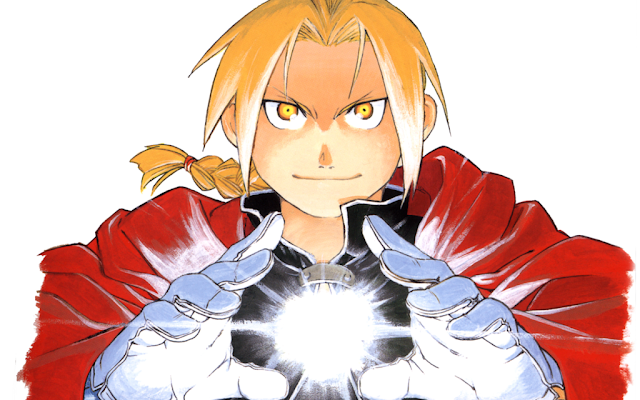Why I Love Fullmetal Alchemist's View on Disability
It's Fullmetal Alchemist's 20th Anniversary today and that fact has basically overridden every braincell in my head. You know those people who make their entire identity one thing and don't ever shut up about it? That's me and Fullmetal Alchemist, except I learned some restraint which is why my twitter is not a flood of FMA memes or fan art. It would be if I wasn't self-conscious of how bad a look that is.
But today's an occasion to celebrate, not to tear others down. Because Fullmetal Alchemist is my favorite thing, ever. No media franchise will hold my heart captive in it's palm better than FMA. But why do I love this franchise so much that I'm one or two impluses away from being a stan account for? Glad you asked.
The basic premise of Fullmetal Alchemist is this, in a world where magic is a science called Alchemy; two brothers, Edward and Alphonse Elric, attempt to use Alchemy to resurrect their dead mother. This works out poorly and leaves Edward mutilated and Alphonse trapped as a living suit of armor. Now they travel their world in search of a way to reverse the damage and return to normal.
Now Fullmetal Alchemist has a lot to say in general. It condemns rabid nationalism. It deals with how far science can go while remaining ethical. It portrays various forms of femininity in a positive light. It deals with how far one can go before redemption is impossible and what it takes to achieve redemption. It deals with forgiveness and how one can give or receive it.
I could go on for days about all this, but what makes Fullmetal Alchemist stand out to me is what it says to folks with disabilities. I'm autistic and messages about disability matter to me. FMA doesn't deal with mental disability, but it feels like it's lesson can be applied to mental disability.
FMA's main protagonist, Edward, has robot limbs; which sounds cool but the series actually goes into detail of how much it kinda sucks. Ed has to wear black to cover the grease, a full installation makes him look part machine, attaching his limbs causes him pain as the wires bind to his nerves, and the sockets and nerves take at least a year of nursing and care before they can be used. Some storylines are actually decided by Ed's disability and it's interesting as prosthetics tend to be used as a "they look cool" thing without thought as to how much it would kinda suck.
Of course there's benefits, enemies who think they hit Ed's flesh tend to hit his metal, he can turn bits of his arm into weaponry like a sword or spike knuckles. It's not all bad but for the most part it's something Ed would rather not deal with. Though he would gladly give up a chance at having normal limbs again if it meant getting his brother's body back; Ed being the one who got him trapped as a suit of armor.
But what's interesting is that the disability of his limbs doesn't make Ed a lesser character or make him want to give up. So often disability is shown as this terrible thing that's the end of someone's world or makes someone lesser. Two examples of that mindset that stand out as extreme but capturing the general vibe are "I Am Autism" and Mass Effect 2's Overlord DLC.
In the "I Am Autism" commercial Autism is portrayed as basically a monster that steals your children in the dark of the night. In the commercials eyes, Autism is this other thing that gets pleasure from ruining your life and happiness. The "charity" behind it, Autism Speaks, is notorious for portraying Autism as worse than death on several occasions; even giving airtime without pushback to parents who wish their child dead.
Meanwhile in the less disgusting but still fucked up, Mass Effect 2: Overlord; it transpires that what was thought to be an A.I. gone rogue is actually an autistic math savant (think Dustin Hoffman in Rainman) who is lashing out after being forced to become a living machine by his brother. Who I will always take the Renegade option of killing because fuck that guy in particular. I normally run those games Paragon but treating those with mental disability like a lab experiment? Nah, you get the bullet.
Those are the wild extremes but are extremes of the two vibes of disability in popular media, worse than death or making someone lesser and helpless. In stark contrast Fullmetal Alchemist accurately treats it as a hardship but one you can adapt to and in some cases turn into a positive. It's actually Edward's mantra, given at the end of the first arc (and second chapter of the manga),
"Get up and walk. Keep moving forward."
It's the mantra of a character who doesn't let his own disability stop him from moving forward in life or achieving his goals. Now I could talk for a quite a bit about how the author of FMA was clearly inspired by a sense of self-determination and communal aid in how her characters were written. But there are people smarter than me who understand that better. My point is that it's refreshing to see a story where disability isn't seen as some terrible worse case scenario.
Honestly Edward's mantra is a harsh comfort in my darkest moments, when I feel like giving up. Because what's the alternative to moving forward? Giving up? Where does that land me? How does that improve my life?
It doesn't. As long as I'm better today than I was yesterday that's what matters. So I get up and walk. I keep moving forward. Because I've still got two strong legs to get me where I'm going.
(I didn't use anime screens because, honestly, Manga Author Hiromu Arakawa's artstyle for promo art and volume covers is amazing and deserves more love. Pick up the Art of Fullmetal Alchemist books, they're great.)







Comments
Post a Comment